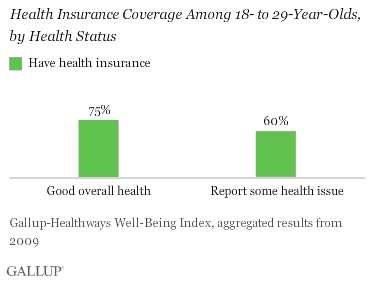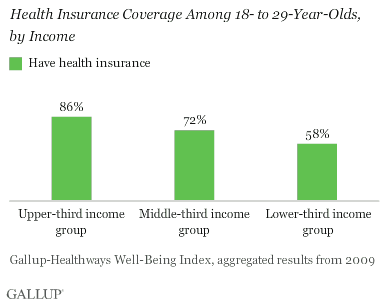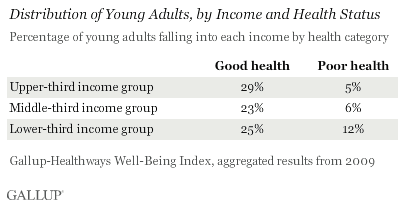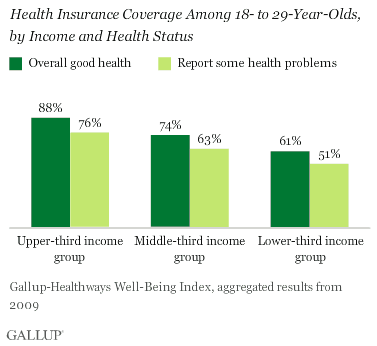PRINCETON, NJ -- Young adults who are in good health are significantly more likely to have health insurance than those who have some health issue, according to an analysis of Gallup Healthways Well-Being Index data from 2009.

This relationship could reflect the possibility that those who have health coverage are better able to manage and maintain their health than those who don't have it, or the possibility that those in poor health may not be able to work and thus not have access to health insurance through a job. But it also seems to suggest that need is not the overriding factor in whether young adults carry health insurance.
Rather, income appears more strongly related to young adults having health insurance. Among those in the upper third of the income distribution among 18- to 29-year-olds (annual incomes of $48,000 or greater), 86% have health insurance. This declines to 72% of those in the middle-third income group (making between $24,000 and $48,000) and to 58% of those in the lower-third income group (making less than $24,000 per year).

The health-income trade-offs of young people are especially relevant in the health insurance reform debate because having healthy people in the insured pool helps keep premiums down for everyone. Anthem Blue Cross and Blue Shield -- criticized by President Obama for its decision to raise healthcare premiums in California by 39% -- specifically cited healthy young people dropping their insurance coverage as a major factor in the company's decision. And the need to include healthy people in the insurance pool is one reason that many health reform proposals (including President Obama's) require Americans to carry health insurance.
From a rational economic perspective, however, it is not necessarily in young adults' financial interests to carry insurance when premiums are high, and the likelihood they will need to use it is low, particularly since young adults make less money on average than older Americans. According to Gallup-Healthways Well-Being Index data from 2009 -- which includes interviews with nearly 30,000 adults between the ages of 18 and 29 -- 72% of young adults have health insurance. The large number of interviews conducted in 2009 provides the opportunity to subdivide this group into categories based on their income and health status to see what proportion of each group has health insurance.
Among 18- to 29-year-olds surveyed, 77% rate their overall health as excellent, very good, or good; report having no health problems; and say that poor health limited their activities for less than five days in the past month. The remaining 23% rate their health as fair or poor, report having some health problem, and say their health limited their activities five or more days in the past month.
The distribution of young adults by income and health status appears in the accompanying table.

The proportion of young adults in each group that carries health insurance suggests that the vast majority of healthy young people who are most able to afford health insurance do carry it. Specifically, 88% of young adults who are in the upper-third income group among their peers and are in good health carry health insurance. That is the highest for any six subgroups of young adults Gallup analyzed based on income and health status. By comparison, 76% of young adults in the highest income group but who have reported some health issue carry insurance.
Health insurance incidence declines significantly among the middle- and lower-income groups among those who are healthy and those who are not. In each case, those who are healthy are more likely to carry health insurance than those who are not at the same income level. And those who have higher incomes are more likely to carry health insurance than those with similar health status at lower incomes. As a result of these combined effects, the proportion of insured young adults drops to 51% among those with the greatest need for health insurance and the least ability to afford it.

A statistical analysis to assess the relative importance of health and income as predictors of young adults' having insurance confirms that both factors are independently related to whether one carries health insurance. But the effects of income are relatively greater -- the odds that a young adult will have health insurance doubles between each successive income group, taking into account the effects of one's health. At the same time, the odds a young adult will carry health insurance are 1.7 times greater among those who are healthy than those who are not, controlling for the effects of income.
Bottom Line
Even though it may not be economically rational, the vast majority of healthy young adults who can afford health insurance carry it, which may reflect their having a job that provides health insurance benefits as well as the decision to take advantage of those benefits. Across income groups, those who are in better health are more likely to have health insurance than those who ostensibly have a greater need for it. So it does not appear common for healthy young adults to opt out of the insured pool.
Gallup-Healthways Well-Being Index data suggest that financial resources are more important than need in determining whether young adults carry health insurance. But the relationship between need and having health insurance in the data seems counterintuitive, with those who are healthier more likely to have insurance than those who are less healthy. It is possible that having health insurance keeps young adults healthy, and it is also possible some third factor is related to both health and income that would account for the relationships.
Gallup's previous report on health insurance by age showed young adults are least likely to have it. The results of the current analysis suggest the bigger challenge to expanding health insurance among young adults may lie more in making it affordable for them than in convincing them they need to have it.
Learn more about the Gallup-Healthways Well-Being Index.
Survey Methods
Results are based on telephone interviews with a random sample of 29,729 national adults, aged 18-29, conducted in Jan.1-Dec. 31, 2009, as part of the Gallup-Healthways Well-Being Index. For results based on the total sample of national adults, one can say with 95% confidence that the maximum margin of sampling error is ±1 percentage points.
Interviews are conducted with respondents on landline telephones and cellular phones.
In addition to sampling error, question wording and practical difficulties in conducting surveys can introduce error or bias into the findings of public opinion polls.
Young adults who are considered to have health issues meet one of the following criteria: rate their overall health as fair or poor, report they have some health problem, or say that poor health kept them from their usual activities for more than five days in the past month.
Young adults who are considered to be in good overall health meet all of the following criteria: rate their health as excellent, very good, or good, say they have no health problems, and report that poor health kept them from their usual activities for less than five days in the past month.
About the Gallup-Healthways Well-Being Index™
The Gallup-Healthways Well-Being Index measures the daily pulse of U.S. wellbeing and provides best-in-class solutions for a healthier world. To learn more, please visit well-beingindex.com.
